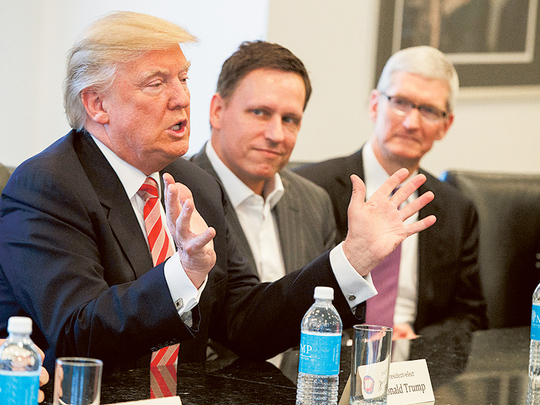
Tim Cook has spoken to Apple employees in a closed Q&A about his decision to meet with US president-elect Donald Trump, arguing that it’s more important to engage than stand on the sidelines “yelling”.
Cook also answered employee questions about the perception that Apple has abandoned its Mac line of desktop computers, and about what he thinks most differentiates the company from its competitors.
Although unsurprisingly deferential in tone, the questions nonetheless provide the clearest insight yet into Cook’s thinking about the election of Trump, who openly and repeatedly railed against Apple in his campaign for the company’s lack of US manufacturing jobs, offshoring of capital, and refusal to aid the FBI in hacking into an iPhone once used by a dead terrorist.
“Last week you joined other tech leaders to meet President-elect Donald Trump,” the questioner said. “How important is it for Apple to engage with governments?”
Cook replied: “It’s very important. Governments can affect our ability to do what we do. They can affect it in positive ways and they can affect in not so positive ways. What we do is focus on the policies. Some of our key areas of focus are on privacy and security, education. They’re on advocating for human rights for everyone, and expanding the definition of human rights. They’re on the environment and really combating climate change, something we do by running our business on 100 per cent renewable energy.”
He added: “There’s a large number of those issues, and the way that you advance them is to engage.
Debate of ideas
Personally, I’ve never found being on the sideline a successful place to be. The way that you influence these issues is to be in the arena. So whether it’s in this country, or the European Union, or in China or South America, we engage. And we engage when we agree and we engage when we disagree. I think it’s very important to do that because you don’t change things by just yelling. You change things by showing everyone why your way is the best. In many ways, it’s a debate of ideas.
“We very much stand up for what we believe in. We think that’s a key part of what Apple is about. And we’ll continue to do so.”
The question and answer, which TechCrunch verified as legitimate, were followed by a less politically-charged query about Apple’s dedication to desktop computers. “We had a big MacBook Pro launch in October and a powerful upgrade to the MacBook back in the spring. Are Mac desktops strategic for us?”, Cook was asked.
His response was that to confirm that yes, “the desktop is very strategic for us. It’s unique compared to the notebook because you can pack a lot more performance in a desktop — the largest screens, the most memory and storage, a greater variety of I/O, and fastest performance.
“Some folks in the media have raised the question about whether we’re committed to desktops. If there’s any doubt about that with our teams, let me be very clear: we have great desktops in our road map. Nobody should worry about that.”
Return on investment
Cook was also asked what he considered Apple’s “biggest differentiator, and what can employees do to foster and advance those efforts?” He argued that the company’s commitment to projects with no clear return on investment was hugely important.
“With so many things that we’ve done, we don’t do it because there’s an return on investment. We don’t do it because we know exactly how we’re going to use it. We do it because it’s clear it’s interesting and it might lead somewhere. A lot of the time it doesn’t, but many times it leads us somewhere where we had no idea in the beginning.”
Apple has not replied to a request for comment.












